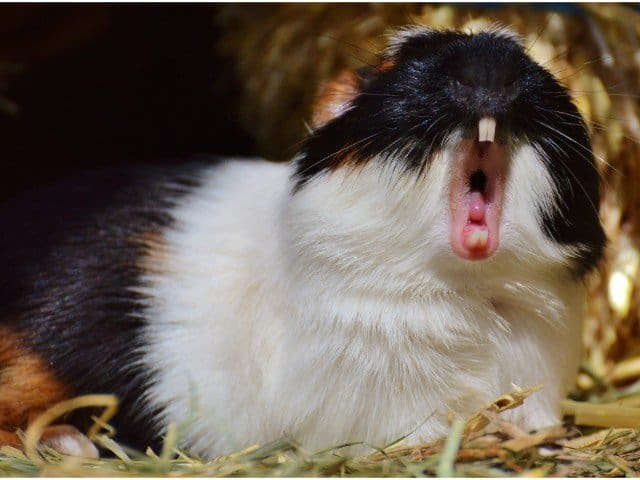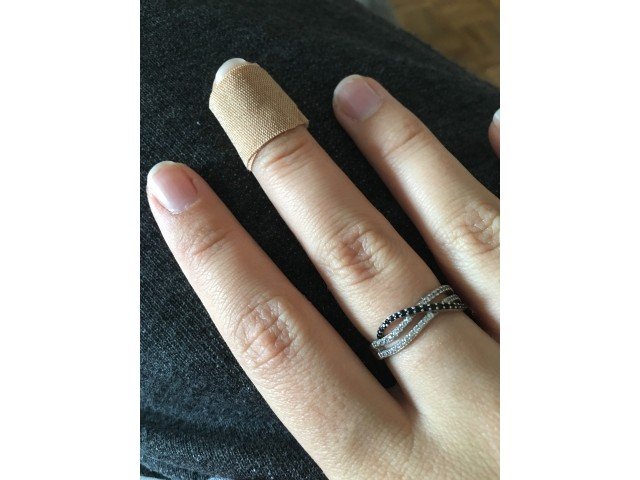Most of the animal bites are from family pets. Guinea pigs are sweet, gentle, and docile animals, yet they bite sometimes. They don’t bite without any cause.
They may bite when subjected to conditions like stress, fear, etc. A guinea pig’s bite does not cause any severe health complications as with other pet animals, yet their bites may be painful.
Guinea pigs rarely bite their owners, and even if they do, it won’t be anything critical. However, if your guinea pig is irritated, it may bite hard, resulting in pain and bleeding. You might need some antibiotics and tetanus shot after the bite. Tetanus shots should be compulsorily taken if not taken in the last ten years.
There may be multiple causes why guinea pig’s bite, and we will discuss it in detail. We get confused between a nip and a bite, so we will also explore the difference between them.
We will know about the potential threats like any infection or the spread of any disease in case you get bitten.
Why do guinea pigs bite humans?
They are widely accepted as pets because of their docile nature, sweet looks, friendly response while feeding and eating.
Guinea pigs tend to develop a strong relationship with its owner and persons. They enjoy playing and grooming with them.
Although guinea pigs share a friendly relationship with their owners, they, too, can bite just like any other pet. It is typical behavior of animals, and so do guinea pigs.
But what triggers the bite? Here are some common causes:
- Afraid: Every animal will bite or attack when subjected to any fear. When a guinea pig is being followed, held up, or deprived of free movement, it can bite in panic.
- Stress: Guinea pigs are susceptible to change in their surroundings and quickly get stress with any unwanted changes. If your guinea pig is not happy with the ambiance, annoyed with any noise, then it may bite. A stressed-out guinea pig is likely to bite.
- Territoriality: Guinea pigs bite if they have a feeling that you are invading their space. Especially unneutered guinea pigs show a territorial behavior. They tend to secure their territory to allure their mating partner.
- Pain and illness: Guinea pig suffering from some pain can bite when you try to hold your guinea pig.
- Mistaking you for food: If your guinea is hungry and your hands smell like the food, they may bite your fingers, assuming it to be the food.
A Guinea pig may bite you as a reaction to your action, which it doesn’t like. It is a normal animal behavior when they get hurt, afraid, or irritated. They bite to express their discontent.
Like small children start crying when they don’t like anything, guinea pigs also bite as negative reinforcement.
Suppose your guinea pig once bites you, and you release them or allow them to play, so next time when they are feeling uneasy when you hold them, it may bite to notify you.
Also read: Do guinea pigs bite?
Difference between nipping and biting in guinea pigs
We need to understand the difference between nipping and biting. Guinea pigs are often found nipping, which we confuse with biting. Biting is rare among guinea pigs.
Nipping is like a small bite or pinch. Guinea pigs do so without keeping their mouth wide open. It hardly hurts and is not painful. This habit is common in other pets too.
Guinea pigs also nip each other to show affection towards each other while grooming. At times, to show their dominance, they even bite one another.
Guinea pig nip one another to establish the order of dominance. They want to attain your attention, or when they want to move you away from its path, they will nip you.
You must not be worried when your guinea pig is nipping you. It is just trying to show its love, affection, and love towards you. If a guinea pig wants something, then also they may nip their owners.
Do guinea pigs bite hurt?
Guinea pigs nipping doesn’t hurt us; instead, you will enjoy them nipping gently. Guinea pigs nip to express themselves to us in a painless manner. But it is not the same for bites.
You will feel the pain when a guinea pig bites you. Guinea pig bites with its mouth wide open and holds tightly. They will not leave quickly and keep on holding hard. You come to know that your guinea pig is furious or afraid of you.
Many argue whether the guinea pigs bite is painful or not. It entirely depends on your tolerance for pain; still, most people suggest that it is painful.
Guinea pigs have long and sharp incisors, which help them to chew hay and leafy vegetables. They can chew through most of the things with their teeth.
Skin also can be cut through easily when guinea pigs bite. The cuts are deep enough to allow bleeding, and it may take a few days to heal the wound.
Young guinea pigs have smaller teeth than adult ones, and their aggression level isn’t so high. So the bite of a young guinea pig is less painful than the adult ones.
Also, it depends on the cause of the bite. If the guinea pig is furious or afraid, it may bite hard, whereas it may bite softly in other situations. You will come to know whatever is the cause.
Are guinea pig bites dangerous?
Once bitten by your guinea pig, you will feel the pain. But is it a potential threat to our health and how long will it take to recover?
The bite of a few animals can be very dangerous, especially those living in the wild. The animals in the wild are the carrier for various germs and pathogens.
We can be exposed to those germs when these animals bite us. That is not the case with domestic animals.
Guinea pigs bite can cause a lot of bleeding, which should be immediately stopped by applying pressure.
If the cut is near to any significant artery, then refer to a doctor; otherwise, it can lead to severe damage. In some cases, there may be some skin infections due to the bite.
It is recommended to get some antibiotics as well as tetanus shots if your guinea pig have bitten you hard.
Do guinea pigs bite spread diseases?

Guinea pigs are infected with various germs, but all these diseases do not get transmitted to humans. These bacteria and viruses are not likely to survive in humans.
However, some guinea pigs do carry diseases that can get transferred to us. These includes:
- Pasteurellosis: Pasteurella bacteria is a common bacteria causing respiratory infection and pneumonia among rodents and guinea pigs. You can be infected if the bacteria are present in the guinea pig.
- Tularemia: It is caused by bacteria that can be transferred from guinea pigs to humans. This disease is not very common but highly infectious and life-threatening too. It can be treated with antibiotics.
- Rabies: This disease is also not very common in guinea pigs. It can be transferred to humans once guinea pigs are infected with it.
- Tetanus: That is a common bacterial toxin that can enter our body through the wound. We should take a tetanus shot as a precautionary measure.
Few other diseases like skin infections can affect us. But this is not transferred by biting. Instead, they are passed on by skin contact.
Guinea pig bites resulting in any disease are rare, and you should visit the doctor if you have further symptoms.
Are guinea pig bites infectious?
A wound can become the gateway for the germs to enter our body, doesn’t matter how the injury took place.
Once the bacteria enter our body, they can be infectious. Our body is exposed to various such bacteria and is highly susceptible to diseases.
When guinea pigs bite you, the germs present in their mouth, teeth, and saliva can enter your body.
As the teeth are not sterilized, guinea pigs bites can be a potential source of bacteria.
These bites can be infectious if left untreated. The care of these bites is natural and can be done at home only. However, if you see any severe signs of infection you must reach out to a doctor.
How to treat a guinea pig bite?

Guinea pig owners have to go through such a situation someday. Although guinea pigs are docile animals, still they can be impatient and bite their owners.
Guinea pig being lowermost in the food chain can quickly feel stressed and afraid for petty reasons.
You should be prepared for how to help yourself when a guinea pig bites you. The following steps will help you with the treatment and get instant relief.
Access the severity of wound
To start with the treatment, we need to assess the severity of the wound.
Guinea pig bites may not be the same all the time. Sometimes the injury may be quite deeper than usual. It will depend more on the shape and size of the teeth.
Guinea pig bites can be treated at home usually, but professional advice may be required in a few rare cases.
Once your pet bites you, keep it away from you as it may bite you again. Observe the damage caused.
It is advisable to put a clean cloth on the wound and apply little pressure to stop blood loss. After preventing the blood loss, you should do the inspection.
The stitching would be required if the wound is:
- Deeper than 1 centimeter (0.3 inches)
- It is nearby to any sensitive area near the face or neck or nearby to any joints which need regular movements.
- Results in continuous bleeding even after placing the cloth and applying pressure for ten minutes.
If any of the above problems are observed, you better visit a doctor for treatment, else you can treat it yourself.
Clean the wound with some cold water
After you have applied pressure for ten minutes, observe the wound. Has the blood flow stopped? Blood may still come out in drip. You should stop using force at this moment.
Wash the wound after the blood flow has stopped. That is required as the guinea pig teeth are not clean and contain food particles and germs. Cleaning the wound would help us remove any such debris and bacteria.
Wash the wound under cold and clean running water. Tap water or any bottled water will do as available. Cleanse the wound with water only and do not try to open or rub the wound as it may start the bleeding again.
You should apply any antibacterial soap available to wash the wound. That is a recommended step to remove any dirt particles. It is going to pain when you use the soap but you should not avoid it.
If the dirt enters the body through the cut, it can be infectious. You have to follow an antibiotic course if the wound is not cleaned correctly, and it gets infected.
Apply some antibiotics over it
Apply a clean and dry cloth on the wound after you have washed it. Care should be taken that you do not rub the wound while applying cloth. Any rupture of the can again cause further problems.
The drying of the injury is also essential as any water particles will develop into pus and won’t let the wound repair fast.
After drying the wound, you put some antibiotic ointment like Neosporin. That is helpful to reduce bacterial activity in the injury and hence prevent any infection.
The antibiotic ointment is just like a protection cover that safeguards you from any infection.
Even if there is any bacterium left inside the wound, the ointment won’t allow it to develop and hence help in repairing the injury faster.
It also moistens the wound, which reduces any irritation. You can also use some pain relieving ointments if it is painful.
Dress the wound to keep infections away
In case the guinea pig hasn’t bitten you hard and the wound isn’t deep enough, you can leave the scar open to heal.
Just see the bleeding is stopped. Still, it is better to apply some ointment and put on a bandage. It keeps the skin around the wound moist.
Moist skin helps the skin to recover faster in the following ways:
- Tissue formation is faster.
- Safeguarding from any infection.
- Reduce scar formation.
Covering up the wound with a suitable bandage helps to protect the wound from any further physical injury. Even if there is some bleeding, the dressing will absorb the blood.
Cover the wound completely; it is better to cover a larger area than the injury. Affix the dressing with an adhesive bandage, like Band-Aid or any surgical tape.
Check for signs of infection
Monitor the development of the healing process daily. You need to change the dressing every day and check if there are any infections.
The bandage may stick to the skin if there is any bleeding. In such cases, don’t pull the bandage with force, instead, soak the dressing with water to loosen up and then remove slowly.
After the removal of the bandage, rewash the wound with soap and water. Dry the wound with a cloth and then examine the wound.
Check whether the wound is healing day by day. If it is not improving, then there is a chance of infection. Look for the following symptoms:
- The skin around the wound is red or warmer than body temperature.
- Inflammation
- Any foul smell is coming out from the injury.
- Pain for a more extended period than a day
- Formation of pus (On the first day, the clear discharge will be formed of the dead cells, but opaque, thick discharge after that is not right).
- Any loss of sensation of the portion of the wound.
The symptoms will be severe, like fever, nausea, weakness, and discomfort when the infection spreads.
Any of the above symptoms should give you an alarming signal of the infection or any disease transmitted from guinea pig, and you should visit the doctor immediately.
Do you need a tetanus shot after a guinea pig bite?
Home treatment is sufficient for the guinea pig bites. Still, many ask whether to take a tetanus shot after being bitten by a guinea pig.
Tetanus is caused due to bacteria entering the body from the wound. The risk is more when we get injured in an open space as the bacteria are found in the soil. Animal bites can also lead to tetanus.
The rate of infection from tetanus is significantly low; still, you must take the precautionary measure.
The tetanus vaccine is active for ten years only, so if you haven’t received the tetanus shot in recent years, it is better to take it. Remember that the vaccine should be made within 48 hours of the incident.
Rabies is another disease which you should be concerned about. It is sporadic among guinea pigs. There is a vaccine available for it also.
This disease virus spreads through saliva. So, there is a chance of it to spread through an animal bite. Visit a doctor immediately if your guinea pig is suffering from rabies. The disease must be treated at the initial stage, or else it can be fatal.
Source: CDC guidelines, Bites and Stings, Microbiology of Animal Bite Wound Infections
Similar Posts:
- Guinea Pig Nail Broke Off? (Injured, Ripped off, Fell Off & Recovery)
- Why Do Guinea Pigs Bite? (How Hard & Ways To Stop them)
- Do Guinea Pigs Need Shots? Guinea Pig Common Health Problems
- Guinea Pig First Aid Kit: Essential Supplies & How To Make One?
- Head Tilt In Guinea Pigs: Causes, Hazards, Treatment & Prevention
